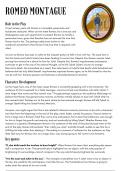ROMEO MONTAGUE
Role in the Play
At just sixteen years old, Romeo is a loveable, passionate and
handsome chatacter. When we first meet Romeo, he is love sick and
Shakespeare uses such opportunity to present Romeo as initially a
petrarchan lover, given that Rosaline has not returned the love that
Romeo has for her. This perhaps adds even further to the
audience's excitement when Romeo finds love that is requited, with
Juliet.
As soon as Romeo lays eyes on Juliet at the Capulet party, he falls in love with her. The issue here is
that his family and Juliet's family have been feuding for some time. Despite this, Romeo marries Juliet,
proving how serious he is about his love for Juliet. Despite this, Romeo's impulsiveness and passion
continues to get in the way of his rational thought, as he kills Tybalt (Juliet's cousin) to avenge
Mercutio's death. He is banished as a result, then later learns of Juliet's fake death whilst banished and
believes she has truly killed herself. Impulsiveness captures Romeo again, as he kills himself so that he
can be with her. Extreme passion and hastiness is ultimately Romeo's hamartia.
Character Development
As the tragic hero, one of the major issues Romeo is constantly grappling with is his immaturity. The
audience at first is exposed to a fickle teenager, once love struck over Rosaline, who later claims "I
have forgot that name and that name's woe." Though perhaps suspicious, the audience likely begin to
believe that Romeo has gained some maturity, as Romeo initially refuses to duel with Tybalt after he
has married Juliet. Perhaps not at the point where he has matured enough, Romeo still kills Tybalt to
avenge Tybalt killing his closest friend, Mercutio.
However, one might argue that this is less related to Romeo's maturity and more to do with a character
trait that from the beginning to the end of the play, never fades, namely his passion. Passion seems to
form a large role in Romeo's fatal flaw, as his love and passion for his best friend Mercutio was enough
for him to forget his growth and maturity, and act erratically by killing Tybalt. Whether Romeo truly
matures is a question Shakespeare leaves to his audience at the end of the play because even at the
end of the play, Romeo still exclaims "then I defy you, stars" and kills himself, unable to see that he is
fulfilling his fate rather than defying it. The ending is a moment of catharsis for the audience, as they
likely feel sorry for Romeo who, as a tragic hero, was always going to fall victim to his hamartia.
Key quotes
"O, she doth teach the torches to burn bright!"- When Romeo first sees Juliet, everything else seems
dull in comparison to her. The personification highlights how an object, with the sole purpose of
brightening it's surroundings, cannot compare to the way Juliet's beauty brightens her surrounds.
"It is the east and Juliet is the sun."- This metaphor exemplifies how if Juliet were to be an object in
the sky, she would be the centrepiece, much like the sun. This foreshadows how Romeo is going to
make Juliet the centre of his own world.
, ROMEO MONTAGUE
Key quotes
'"I dreamt my lady came and found me dead -
Strange dream, that gives a dead man leave to think!"-
Shakespeare uses Romeo's dream to forebode him being found lying
dead. The dramatic irony here is that this is exactly how the play is
going to end- Romeo found lying dead with Juliet.
'"Death hath had no power yet upon thy beauty"- Even lying
dead, Juliet's beauty, according to Romeo, remains untarnished. This
quote says less about Juliet's objective beauty, and more about
Romeo's reverence of Juliet.
Contextual link
At the beginning of the play, Romeo is the typical Petrarchan lover, falling for Rosaline despite the fact
that she does not like him back. The emotional rut which Romeo was enduring, that his friends were
trying to pull him out of, was a natural occurrence after discovering that one's love is unrequited.
However, Romeo moves from a Petrarchan lover to a courtly lover.
Courtly love (the act of courting a lady in waiting) was supposed to be classy, restrained and polite,
but in the play, Romeo's courtly love is rather intense and dramatic. Courting usually involved gift-
giving, but not much contact between the two lovers. However, Romeo somewhat undermines the
purity of such courtly love by becoming obsessive about his love for Juliet, which was ultimately his
fatal flaw. Despite this, Romeo does show signs of typical courtly love, as when Romeo and Juliet meet
for the first time, their sentences each form a sonnet structure, with such structure often associated
with romantic love.





